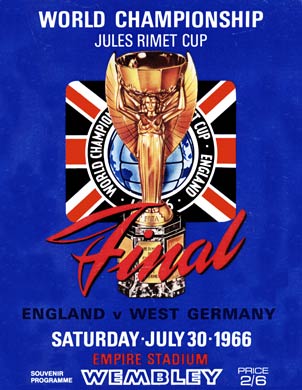 Author, scholar, and journalist David Goldblatt is probably best known for his sacred text of football studies: The Ball is Round: A Global History of Soccer. On Thursday, March 15 (The Ides of March!), Goldblatt shared work from his new project — a sort of mini-Ball is Round book on the cultural politics of football in Britain after 1989.
Author, scholar, and journalist David Goldblatt is probably best known for his sacred text of football studies: The Ball is Round: A Global History of Soccer. On Thursday, March 15 (The Ides of March!), Goldblatt shared work from his new project — a sort of mini-Ball is Round book on the cultural politics of football in Britain after 1989.
In an engaging public talk at the Department of History at Michigan State University, Goldblatt used the upcoming European Championships in Poland/Ukraine and the London Olympics, to explore the changing relationship between football, Britishness, and Englishness in the age of devolution.
The spontaneous popular theater of the Euros, he argues, carves out an arena for England’s traveling fans to declare their “Englishness.” Fans’ rejection of the Union Jack in favor of the flag of St. George and their performance of particular national songs are cases in point. In the case of the 2012 Olympics, Goldblatt notes that there will be no “England” in the tournament because the International Olympic Committee, unlike FIFA, deals only with sovereign states. (Britain has four members in FIFA: England, Scotland, Wales, and Northern Ireland.) The formation of the British Olympic football team thus becomes very contentious in a postdevolution context, with only England firmly supporting it. A striking contemporary example of football’s singular significance for popular national identity.
Listen to Goldblatt’s talk here.
Category: Fútbology
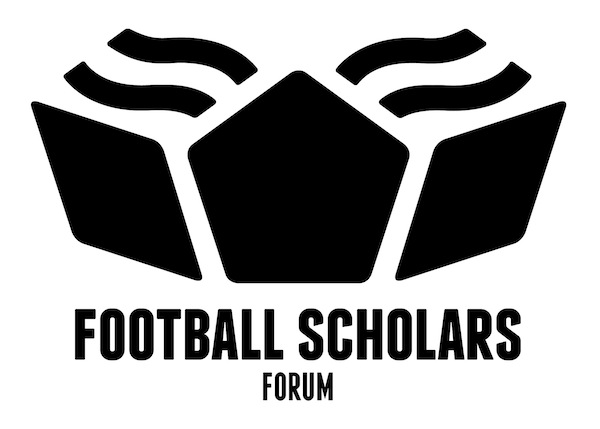
Professional soccer in the U.S.A. took center stage at the Football Scholars Forum on Friday (Feb. 24). Ray Hudson not only braved the “football think-tank,” but also answered questions in the inimitable style he brings to broadcasting a Clásico on GolTV.
Using the documentary film Once in a Lifetime: The Extraordinary Story of the New York Cosmos, FSF discussed Cosmos and the NASL, as well as the representation and construction of history on film. “We had it all, man!” said Hudson looking back fondly to his playing days with the Ft. Lauderdale Strikers. The audio recording of the conversation is here.
FSF is holding its next online session on March 16, 2pm EST. Author David Goldblatt will be in East Lansing, Michigan, to discuss the second half of his book, The Ball is Round. FSF’s discussion of the first installment is here. For more information, contact Alex Galarza: galarza1[AT]msu[DOT]edu
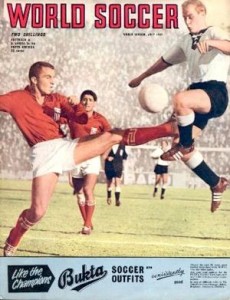 Stryker-Indigo New York, a private multi-media film and print production company, has announced the acquisition of a major collection of 1950s-1960s 8mm and 16mm soccer films.
Stryker-Indigo New York, a private multi-media film and print production company, has announced the acquisition of a major collection of 1950s-1960s 8mm and 16mm soccer films.
The film footage, featuring both university and international teams playing in American cities, contains rare home movie images of the history of the game in the United States. For example, there is footage of the first leg of the 1961 U.S. Open Cup Final between United Scots of Los Angeles and Ukrainian Nationals of Philadelphia at Rancho La Cienega Stadium in LA (now Jackie Robinson Stadium).
According to the Stryker-Indigo web site, its Futbol Heritage Archive houses nearly 9,000 historic photographs, slides, newspaper clippings, postcards, trophies, jerseys and artifacts. Following the closure of the US Soccer Hall of Fame in Oneonta, NY, researchers have lost access to an archive of more than 80,000 items, including the North American Soccer League archive and the 1994 World Cup archive. It is hoped that private collections such as Stryker-Indigo’s film footage will be made accessible to soccer researchers and aficionados so that the history and culture of the game can be properly recorded and disseminated.
***
Thanks to David Wallace for inspiring me to write this post.
Fútbol in the Classroom
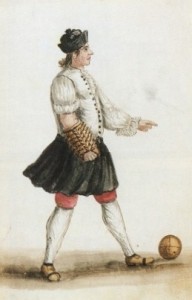 The Football Scholars Forum — an online community of scholars that discusses serious fútbol scholarship — convenes on Wednesday, November 9, at 2pm EST (-5 GMT) for a session on “Soccer in the Classroom.”
The Football Scholars Forum — an online community of scholars that discusses serious fútbol scholarship — convenes on Wednesday, November 9, at 2pm EST (-5 GMT) for a session on “Soccer in the Classroom.”
Several scholars will make short presentations about university football courses in various disciplines in the humanities and social sciences. Course syllabi have been pre-circulated on the website.
Among the questions to be discussed: How can teaching a course or unit on soccer expand or contribute to disciplinary knowledge? What are the challenges and opportunities of teaching a fútbol class filled with everyone from fantasy soccer geeks to soccer neophytes? How can students apply what they learn in a football course outside the classroom? Interested participants can join the conversation via Skype by contacting Alex Galarza.
In related news, FSF is to be featured in a poster session at HASTAC 2011, a conference on digital scholarly communication at the University of Michigan in December.
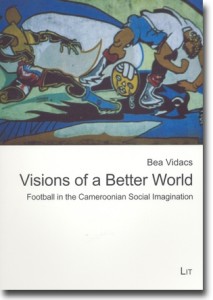
The 1990 World Cup hosted by Italy is often remembered for the exploits of Cameroon’s Indomitable Lions. Led by 38-year-old striker Roger Milla, Cameroon legitimized African football on the global stage with their 1-0 victory over Maradona’s Argentina in the opening game and then becoming the first African team to reach the World Cup quarterfinals. In 1994, Bea Vidacs, a Hungarian anthropologist based in the United States, landed in Yaoundé to begin her research on football and identity in Cameroon. Visions of a Better World: Football in the Cameroonian Social Imagination is a revised version of a doctoral thesis completed in 2002, a study that over the years midwifed several very good journal articles and chapters in scholarly collections.
Read my full review at H-Soz-u-Kult.
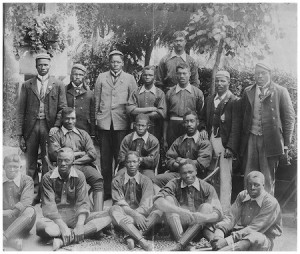 In Making History, a BBC Radio 4 series exploring ordinary people’s links with the past, we learn about the first African team to play in Europe. Making History listener Eryl Freestone has a memoir written by her grandfather which describes a tour of black South African footballers that he helped organize in 1899, just as the South African War was about to start. Eryl meets with Chris Bolsmann at Aston University who has been researching the tour and was desperate to find an ancestor of WM Williams’ – Ery’s grandfather.
In Making History, a BBC Radio 4 series exploring ordinary people’s links with the past, we learn about the first African team to play in Europe. Making History listener Eryl Freestone has a memoir written by her grandfather which describes a tour of black South African footballers that he helped organize in 1899, just as the South African War was about to start. Eryl meets with Chris Bolsmann at Aston University who has been researching the tour and was desperate to find an ancestor of WM Williams’ – Ery’s grandfather.
Listen here (segment starts at 09:00).
Fútbol and Politics in Chile
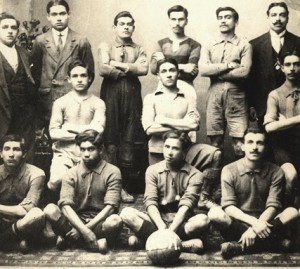 The Football Scholars Forum launches its 2011-12 season this Friday (Sept. 23, 3pm EDT) with Brenda Elsey’s new book Citizens and Sportsmen: Fútbol and Politics in Twentieth-Century Chile (University of Texas Press, 2011). It’s a fresh look at life in twentieth-century Chile through an exploration of how fútbol clubs integrated working-class men into urban politics, connected them to parties, and served as venues of political critique. You can join the conversation online via Skype. For more information visit the FSF website.
The Football Scholars Forum launches its 2011-12 season this Friday (Sept. 23, 3pm EDT) with Brenda Elsey’s new book Citizens and Sportsmen: Fútbol and Politics in Twentieth-Century Chile (University of Texas Press, 2011). It’s a fresh look at life in twentieth-century Chile through an exploration of how fútbol clubs integrated working-class men into urban politics, connected them to parties, and served as venues of political critique. You can join the conversation online via Skype. For more information visit the FSF website.